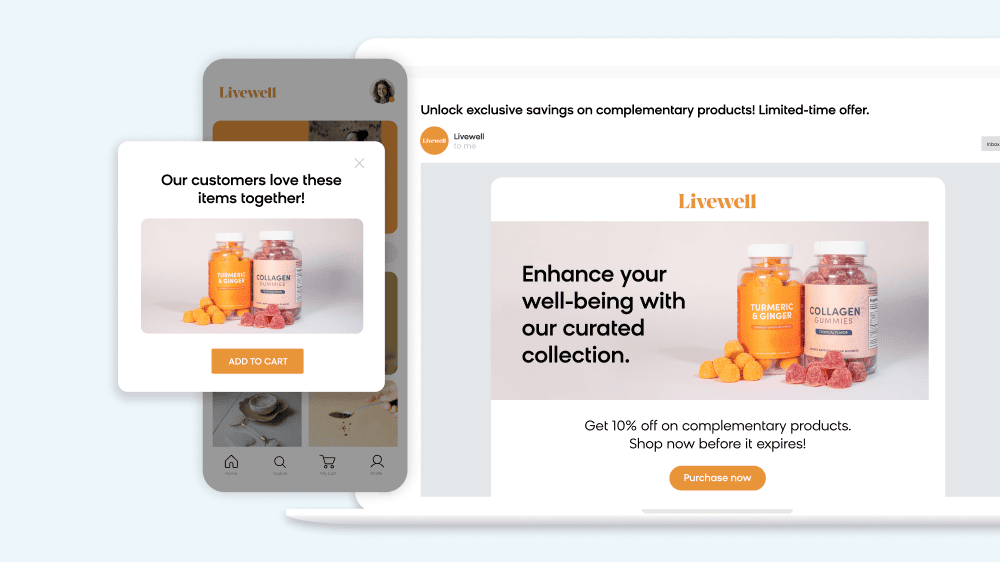Artificial intelligence (AI) is all anyone is talking about — and for good reason. It’s changing the way we all live, communicate, shop, and work.
But of all the widespread changes it has ushered in, AI has arguably made the biggest splash in the marketing world. Ecommerce marketing professionals are uniquely positioned in the center of AI’s evolution — it’s reshaping their day-to-day job responsibilities, changing the way their customers shop, and altering how ecommerce businesses function as a whole.
So much progress has been made in such little time that it can feel hard to keep up. There are new AI versions, interfaces, and features hitting the market all the time, but there’s no need to feel overwhelmed by all these changes.
Being at the crux of AI’s rise is a good thing. All you need to do as an ecommerce professional is be open to the progress being made and be willing to adapt to meet the future head-on.
So, how do you get in the right mindset and position yourself for success? Here’s how marketers are undertaking the challenge of AI and staying ahead of the curve.
Recognize AI as a Strategic Partner
The first thing every marketer needs to do is adopt the right mindset — AI isn’t your competitor, it’s your strategic partner. It’s not here to replace you, erase your job, or take over the world. These tools are designed to enhance your capabilities and help you deliver the best results.
The biggest advantage of generative AI is its ability to analyze vast amounts of data, and to do so faster than any human could. The speed and scale of this computing power can help you in so many ways — it can be a catalyst for the content creation process, help you build a more personalized customer experience, and provide invaluable insights into metrics like customer behavior, market trends, and operational efficiency.
In short, AI helps you streamline key areas of your day-to-day job. And as a modern marketer, it’s your prerogative to find the holes that AI can fill to make your job run smoother.
For Rebecca Reed, Senior CRM Executive at World of Books Group, AI plays the role of a helpful guide or assistant for whatever she’s trying to achieve. This started with content creation, but expanding AI’s use and adopting new tools was a simple matter of finding the right fit to reach a goal.
“AI has absolutely boosted my team’s productivity. It started out with ChatGPT, but now we use AI tools that help with mind mapping, repurposing old content, and SEO,” Reed explains. “And my knowledge of more tools has grown as they have advanced.”
With the right mindset, AI can be whatever you need it to be — an assistant, a collaborator, a researcher, and more. It’s all about finding the right role where it can boost efficiency and creativity while also keeping you from getting bogged down in routine or mundane tasks.
Learn the Art of Prompting
Crafting quality prompts is one of the most important skills that marketers need to cultivate. It’s so essential that “prompt engineering” is quickly becoming a sought-after skillset and an emerging profession in its own right.
Prompts are the instructions or queries you create that guide artificial intelligence in performing tasks or generating outputs, and making these prompts is truly an art form. Conversational AI has the power to understand and respond to a user’s questions, commands, and requests, but making your intent crystal clear is crucial for generating the output you’re looking for.
To create quality prompts, you need to know what AI can and can’t do, and use the nuances of language to hone in on the right questions that will yield the right answers.
Lasse Aagaard Pedersen, the Technical Director and Lead Architect at Nexus Ambition, recognizes how important prompting is for marketers and sees it as the next evolution of typing the right phrases and descriptors into a search bar to get the right search results — except with generative AI, the outcomes can provide unparalleled benefits.
“To maximize the potential of AI, we must articulate our prompts in greater detail to elicit the best responses,” Pedersen explains. “While short prompts may yield some results, the most accurate answers require us to describe precisely what we want.”
With the right questions, there’s so much to be gained from AI. You can use prompts to analyze customer data, create multiple variations for marketing messages, optimize your inventory, and so much more. You just need to find the right questions to ask, and this comes from experimenting with different prompts, knowing your AI’s full capabilities, and finding the right linguistic path to get the ideal output.
Stay Engaged To Shape the Future
AI is a rapidly evolving field. New advancements are being made every day, and as an ecommerce professional, you need to stay engaged and participate in AI’s progress to be a part of the future.
This doesn’t necessarily mean you need to be at the very forefront of each new tool or technological breakthrough, but it is important to keep pace with how AI is changing and influencing your field. You need to know what industry leaders are talking about, what tools your peers are using and experimenting with, and what use cases AI can help you with to optimize your efforts.
Abobakr Magdy, CRM Manager at Alshaya Group, understands how important it is to stay informed and actively engaged with AI’s advancements. “Anyone with AI utilization experience will have an edge over other people in the same role,” Magdy explains. “It will help and support you on day-to-day tasks, giving you time to focus on the bigger picture and develop new strategies.”
Knowledge and experience with AI tools are the best ways to stay ahead of the curve. And the more experience you gain, the more productive you can be.
For example, just by reading this blog, you’re actively engaging and seeking out new information that deepens your understanding of what AI can do. Continuously educating yourself, attending industry events, and staying abreast of the latest research and trends in AI can go a long way.
There are tons of resources that can help you stay engaged. You can sign up for relevant newsletters (like The Edge), listen to podcasts that explore AI’s new role in ecommerce (like the Commerce Experience podcast), and follow industry leaders like Bloomreach on social media to stay updated with the latest blogs, trends, and discussions. Simple steps like these can make all the difference as artificial intelligence grows and expands to influence more industries and aspects of ecommerce marketing.
Remember: You’re not just a passive observer in the age of AI; you’re an active participant. By staying engaged and continuously upskilling, you can help shape the future of AI in ecommerce.














